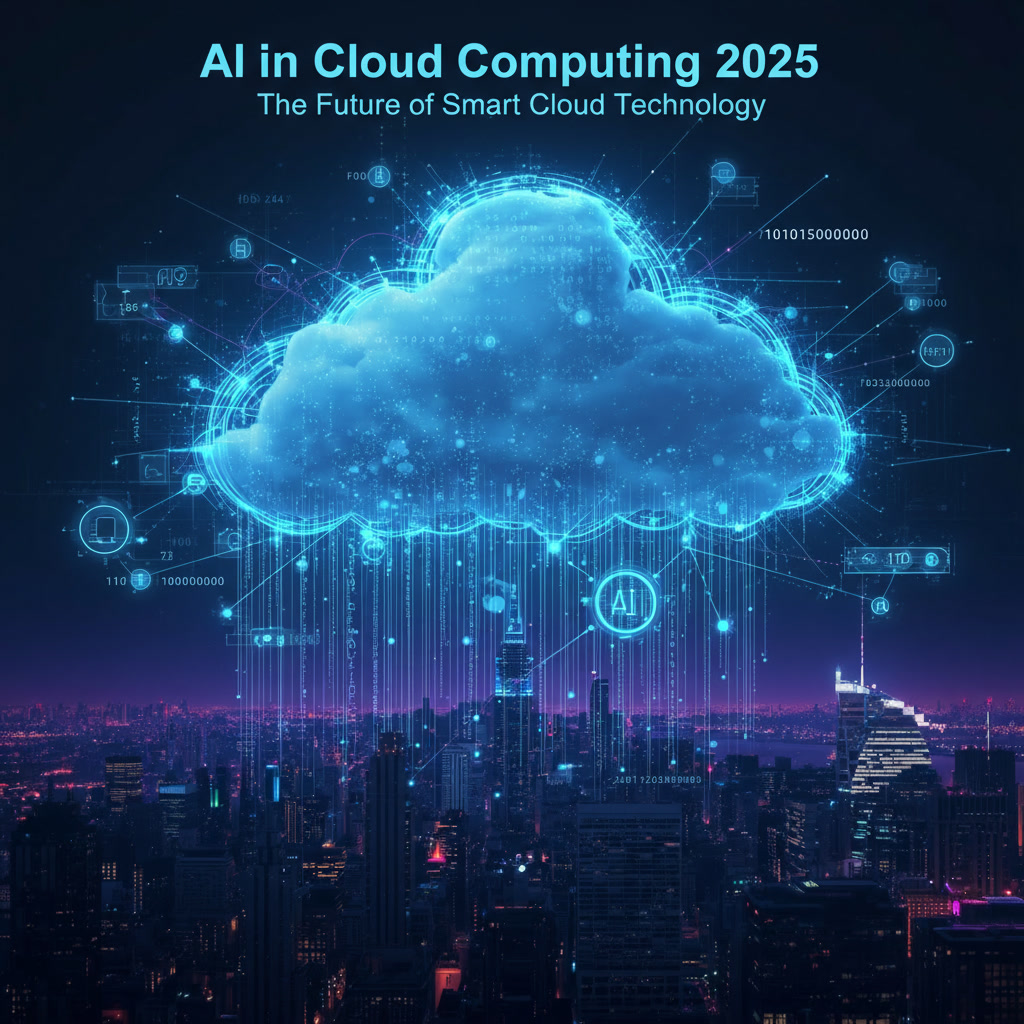The AI in Cloud Computing 2025 revolution is here — and it’s transforming how businesses deploy, manage, and scale their digital operations. Artificial intelligence (AI) is no longer just an add-on; it’s becoming the backbone of modern cloud ecosystems. From optimizing resources to predicting failures before they occur, AI-powered cloud platforms are setting new benchmarks for efficiency and intelligence.
As enterprises accelerate digital transformation, the integration of AI and cloud computing is creating smarter, faster, and more secure infrastructures that are redefining the future of IT.
1. How AI is Revolutionizing Cloud Resource Management
One of the most remarkable transformations brought by AI in cloud computing 2025 is in intelligent resource allocation. Traditional cloud systems often struggle with workload balancing, leading to wasted resources and higher costs.
AI algorithms now analyze usage patterns in real time, automatically scaling servers, memory, and storage according to demand. Companies like Google Cloud AI and AWS AI Services use predictive analytics to manage workloads dynamically, ensuring optimal performance while minimizing expenses.
Example: Google’s “AutoML” and AWS’s “SageMaker” allow developers to automate model training and deployment directly within the cloud — reducing time and cost dramatically.
👉 Learn more about Google Cloud AI
2. Enhanced Cloud Security Through AI Integration
Cybersecurity threats continue to evolve, but AI in cloud computing 2025 has introduced a new level of defense. Machine learning algorithms can now detect and neutralize suspicious behavior before it causes harm.
AI-driven intrusion detection systems continuously monitor network traffic and system logs, learning from patterns and adapting in real time. Cloud providers like Microsoft Azure AI employ predictive threat intelligence, reducing false positives and protecting sensitive data from emerging attacks.
In a world where data breaches cost companies millions, AI-enhanced cloud security isn’t optional — it’s essential.
3. AI-Powered Automation: The Next Step in Cloud Evolution
Automation is where AI in cloud computing 2025 truly shines. By using AI orchestration tools, cloud environments can self-manage, self-heal, and even self-optimize.
For example, AI can automatically migrate workloads to regions with lower latency or cheaper energy rates — all without human intervention. This leads to smarter, green cloud infrastructure, cutting both costs and carbon footprints.
Companies like IBM Cloud AI are leading the charge, combining automation with cognitive computing to simplify cloud operations.
4. AI and Cloud Data Analytics: Turning Data into Decisions
Every second, businesses generate terabytes of data. Without AI, much of it goes unused. The integration of AI in cloud computing 2025 allows organizations to transform raw data into actionable insights instantly.
Cloud-based analytics platforms like Snowflake, Databricks, and Google BigQuery now use machine learning to detect trends, forecast demand, and improve decision-making.
For marketers, this means personalized campaigns; for healthcare, it means predictive diagnostics; for finance, it means real-time fraud detection.
5. AI in Multi-Cloud and Hybrid Environments
As companies adopt multi-cloud or hybrid cloud strategies, AI plays a crucial role in orchestrating workloads across different platforms.
AI-driven tools ensure seamless integration between private and public clouds — optimizing data flow, compliance, and performance.
Platforms like VMware Tanzu and Red Hat OpenShift leverage AI analytics to monitor cross-cloud health and automatically resolve performance bottlenecks.
AI in Cloud Computing 2025 is making hybrid environments smarter, faster, and more resilient than ever before.
6. Future Trends: Where AI in Cloud Computing is Heading
The coming years will bring even deeper integration of AI into cloud systems. Here’s what to expect:
- AI-as-a-Service (AIaaS): Cloud providers will offer pre-trained AI models for instant deployment.
- Quantum Cloud + AI: Emerging technologies like quantum computing will supercharge AI capabilities in the cloud.
- Sustainability Focus: AI will help reduce energy consumption across global data centers.
- Edge + Cloud Synergy: With edge computing, AI will move closer to devices, reducing latency and improving real-time responses.
7. Real-World Use Cases of AI in Cloud Computing
- Netflix uses AI in the cloud to recommend content and manage traffic spikes.
- Amazon Web Services (AWS) uses AI to forecast server capacity and reduce downtime.
- Salesforce Einstein AI delivers real-time customer insights through cloud automation.
These examples prove that AI in cloud computing 2025 is not just a trend — it’s the foundation of intelligent digital ecosystems.
8. Challenges and Ethical Considerations
Despite its promise, AI-driven cloud computing raises challenges in data privacy, bias mitigation, and ethical AI use.
As AI models process vast amounts of user data, cloud providers must ensure compliance with global standards like GDPR and ISO/IEC 27001.
Responsible AI governance will be key to balancing innovation with ethics in cloud computing.
Conclusion: The Intelligent Cloud of 2025 and Beyond
The convergence of AI and cloud computing marks a turning point in digital history. From smarter automation to predictive analytics and fortified security, AI in cloud computing 2025 is redefining how businesses operate, innovate, and grow.
As we move forward, organizations that embrace AI-integrated cloud systems will gain a strategic advantage — becoming faster, safer, and more adaptive in the ever-evolving digital landscape.
